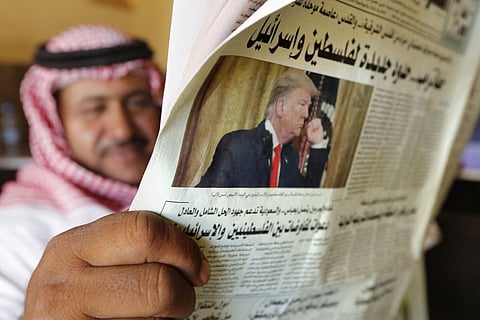Trump plan’s first result: Israel will claim sovereignty over part of West Bank
Move takes in up to 30% of occupied West Bank and give Israel a permanent eastern border

Occupied Jerusalem: The only immediate consequence of the Trump peace plan - and possibly all that will ever come of it - was the green light President Donald Trump gave to Israel on Tuesday to expand its territory by effectively annexing vast stretches of land it has long coveted on the West Bank.
On paper, the plan offers the Palestinians a state, at last, as well as a partial four-year settlement freeze while they mull it over.
But Prime Minister Benjamin Netanyahu will not wait, saying that he would move Sunday to apply sovereignty over the strategically vital Jordan Valley and to all Jewish colonies in the West Bank.
The move would take in up to 30% of the occupied West Bank, and for the first time establish what Israeli leaders have coveted since capturing the territory in the 1967 War: a permanent eastern border for Israel along the Jordan River, recognized by the United States.
It would ensure that Israel would never have to leave places like Hebron, Shiloh and Beit El, which Jews consider their biblical heartland.
Netanyahu’s action was explicitly blessed by Trump on Tuesday, when he promised to “recognize Israeli sovereignty over the territory that my vision provides to be part of the state of Israel.”
Standing beside Trump at the White House, Netanyahu commended him for recognizing Israel’s need for a buffer along the Jordan River, giving it strategic depth against enemies to the east and the ability to prevent the smuggling of weapons to the Palestinians.
“This is something we’ve longed to have,” Netanyahu said, adding that applying sovereignty along the Jordan would “enable Israel to defend itself, by itself.”
Earlier peace proposals envisioned uprooting tens of thousands of Israelis from West Bank colonies to give those areas to the Palestinians for their own state.
But the Trump plan promises to leave both colonists and Palestinians in their homes.
The conceptual map drawn up by the White House looks torturously gerrymandered, all but erasing the pre-1967 boundary that long formed the baseline for a potential agreement.
Islets of Israeli territory dangle on access roads from what is now Israel proper like so many earrings, and new Palestinian enclaves nearly as large as the Gaza Strip are dreamed up in what is now the Negev Desert along the Egyptian border.
It also appears to reward Israel for having created facts on the ground: The would-be Palestinian capital, for example, would be cobbled together from East Jerusalem neighborhoods that Israel cut off from the rest of the city when it built its security barrier.
The plan also contemplates land swaps that could give the Palestinians parts of what is now Israel in exchange for letting West Bank colonies remain, though some of those areas of Israel are heavily populated by Palestinians.
Dan Rothem, a former aide to Prime Minister Ehud Olmert who specializes in maps of proposed peace deals, estimated that the Trump plan would give the Palestinians land equivalent to 84% of what they had before the 1967 war.
The green light from the White House outraged Israeli supporters of a more generous accommodation with the Palestinians and alarmed those who have warned that any annexation could set off renewed violence.
“It’s worse than any of us could anticipate,” said Nimrod Novik, a longtime peace negotiator and former aide to the Israeli leader Shimon Peres.
The Palestinians had no hand in the plan’s drafting, having cut all ties with the Trump administration after it recognized Jerusalem as Israel’s capital.
But while they reacted with predictable anger, there was no threat of specific action and little to suggest that their relationship with Israel would fundamentally change.
Hanan Ashrawi, a senior Palestine Liberation Organization executive committee member, called the Trump plan “a real existential assault on Palestine and the Palestinian people.”
“It’s an Israeli-American agreement that has nothing to do with peace,” she said.
Sign up for the Daily Briefing
Get the latest news and updates straight to your inbox






